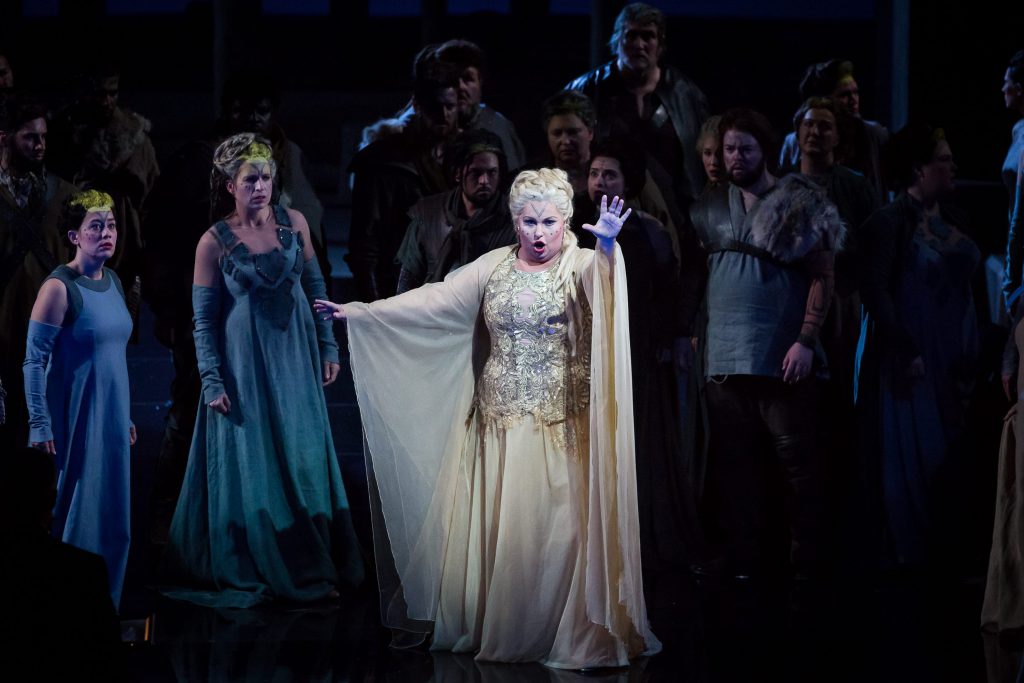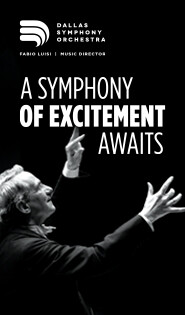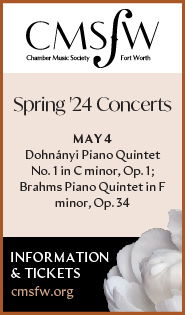Houston Grand Opera’s beautifully sung “Norma” revives a glorious past

Soprano Liudmyla Monastyrska was captivating in the title role of Bellini’s “Norma” at Houston Grand Opera. Photo: Lynn Lane
Barring a big, bad surprise, Houston Grand Opera’s production of Norma is the company’s last in its Resilience Theater. All season, the makeshift opera house in a convention center exhibit hall has been a reminder of the devastation wreaked by Hurricane Harvey, which inundated the company’s home.
But when Norma opened Friday, it harkened instead to good old days — of opera, that is. Vincenzo Bellini’s bel canto extravaganza might have been all but forgotten if not for a few commanding performers who who exploded onto the scene more than a half-century ago and revealed its musical and dramatic depths.
This may sound farfetched, but Friday’s performance yielded echoes of those heady days. Soprano Liudmyla Monastyrska, in the title role, set her voice loose in stratospheric pianissimo flights: Again and again, she conjured up memories of Montserrat Caballe, the revered spinner of vocal gossamer. When mezzo-soprano Jamie Barton, playing the young priestess Adalgisa, blended her rich tones with Monastyrska’s in their Act 2 due, “Mira, o Norma,” the mellifluous outcome recalled the classic pairing of Joan Sutherland and Marilyn Horne.
Enough name-dropping. Those and other vocal exploits didn’t just supply aural delights. They drove home the passions that propel Bellini’s tale of a Druid priestess tormented by her illicit love for a Roman.
Thanks to Monastyrska’s long-breathed, richly shaded singing, Norma’s character radiated emotion. As Norma gazed at her sleeping children — her sons with her paramour Pollione — at the start of Act 2, the Ukrainian soprano lent Bellini’s expansive melody a sweetness that revealed the love Norma felt for them despite her guilt. Revealing the children’s existence to her father, Monastyrska delivered Norma’s plea for their safety in phrases that were veiled in tone but packed with feeling.
And when Norma’s emotions erupted, her outbursts rang out with a wallop that eclipsed the formidable power Monastyrska brought to HGO’s 2013 staging of Verdi’s Aida. The discovery that Pollione and Adalgisa are secret lovers is the impetus for many flare-ups as Bellini’s drama unfolds, and Monastyrska’s vibrant, full-throating singing came across ferociously despite the Resilience Theater’s dry acoustics.
The one spot where the room got the better of her was in Norma’s entrance aria, the bel canto classic, “Casta diva.” Monastyrska sang it with a transparency and fluency that would probably find few rivals from other sopranos. But she was perched on a platform high above the stage, with nothing to help those delicate phrases project into a theater dominated by drapes. And the quiet but constant whoosh of fans— maybe the cooling fans for lights, maybe the overall air conditioning— competed. At times, Bellini’s traceries were barely audible.
Barton equalled Monastyrska’s richness, nuance and impact. In Adalgisa’s first scene, which revealed her anguish about two-timing Norma, the darkness and weight of Barton’s voice captured Adalgisa’s heavy-heartedness even at a whisper. Every phrase was alive and expressive.
In the scenes rooted in Adalgisa and Norma’s tenderness, Barton and Monastyrska brought Bellini’s music a warmth and coziness that radiated throughout the theater. But Barton’s red-blooded tones also packed a punch in the more dramatic numbers, beginning when Adalgisa confesses her anxieties to Pollione. A couple of times, Barton let fly with riveting two-octave vocal salvos: The second one, in the lead-in to “Mira, o Norma,” made the duet’s euphony all the more powerful by contrast.
Tenor Chad Shelton, as Pollione, brought the role a gleaming, vibrant voice that enabled him to more than hold his own amid his formidable colleagues. The vigor of Shelton’s singing put across Pollione’s ardor and impetuousness without veering into bluster. Shelton didn’t necessarily need force to bring out the urgency of Pollione’s declarations: Sometimes, his crisp, pointed enunciation did the job.
Bass Peixen Chen, who relished Dr. Bartolo’s antics in Rossini’s The Barber of Seville in January, cut a stately figure vocally and visually as the Druidic priest Oroveso, Norma’s father. Soprano Yelena Dyachek brought an unassuming, sympathetic bearing to Norma’s confidante, Clotilde.
Portraying a Druid populace eager to fight the Romans, the HGO Chorus got across the hot-headedness by singing with crispness and vitality, not bellowing. Conductor Patrick Summers and the HGO Orchestra brought Bellini a crispness and clarity of their own.
Since the Resilience Theater has no pit, the orchestra was off at the side, to the audience’s right of the stage. The acoustics thinned out its sound, and part of the group was hidden behind drapes. That was particularly unfortunate for the cellos: They sounded distant in the big melody at the start of Act 2, but played with poise, as best as one could tell. The flute, in a more strategic position for aiming at the audience, introduced the “Casta diva” tune sweetly.
But the orchestra still put across some of the flashes of color in Bellini’s score. While Summers brought out the opera’s overall flow, he also — with the help of an assistant conductor right in front of the stage — gave Monastyrska and Barton ample time to luxuriate in the music’s most eloquent turns.
Stage director Kevin Newbury may well have shaped the action more expansively in the full-fledged theaters where his production has otherwise been performed. But in the Resilience Theater, the staging mostly kept the principals near the front edge of the stage, where their voices had the best chance of projecting. And their acting was generally simple, dignified and effective.
David Korins’ set was dominated by a grey, barn-like temple. Sliding doors flanked by two giant bulls’ heads — evidently a sacred image for his Druids — revealed an outdoor of slender tree trunks, sometimes with snow falling amid them. As the opera’s climaxed approached, the Druids rolled onstage a giant bull made of wooden lath, and that became Norma’s pyre.
Jessica Jahn’s costumes sidestepped the ancient times of the opera’s scenario and instead suggested more recent centuries. Some of the Druid men resembled Davy Crockett, albeit without the coonskin cap; some Druid women had gowns that bared part of their shoulders.
Norma was decked out in a glittery white gown, long earrings, and an elaborate blonde hairdo. (One audience member said she looked like Mae West.) Whatever all that was supposed to evoke, the singing eclipsed everything.
Norma runs through May 11 at the Resilience Theater in Houston’s George R. Brown Convention Center. houstongrandopera.org; 713-228-6737.


